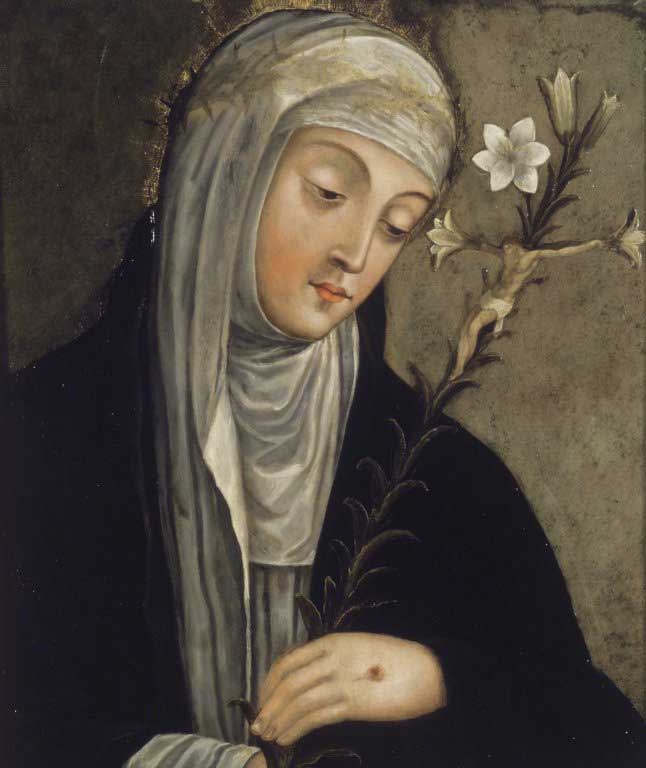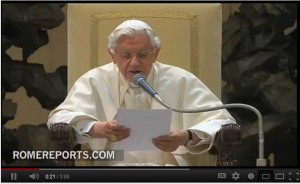[powerpress]
My Nature Is Fire
In your nature, eternal Godhead,
I shall come to know my nature.
And what is my nature, boundless love?
It is fire,
because you are nothing but a fire of love.
And you have given humankind
a share in this nature,
for by the fire of love you created us.
And so with all other people
and every created thing;
you made them out of love.
O ungrateful people!
What nature has your God given you?
His very own nature!
Are you not ashamed to cut yourself off from such a noble thing
through the guilt of deadly sin?
O eternal Trinity, my sweet love!
You, light, give us light.
You, wisdom, give us wisdom.
You, supreme strength, strengthen us.
Today, eternal God,
let our cloud be dissipated
so that we may perfectly know and follow your Truth in truth,
with a free and simple heart.
God, come to our assistance!
Lord, make haste to help us!
Amen.
This entry was posted on Tuesday, December 31st, 2013 at 3:26 am
You can follow any responses to this entry through the RSS 2.0 feed.
Dr. Matthew Bunson discusses the life, times and teachings of St. Augustine of Hippo (part 2)
[powerpress]
Augustine of Hippo [
-Â Confessions
-Â Letters
-Â City of God
-Â Christian Doctrine
-Â On the Holy Trinity
-Â The Enchiridion
-Â On the Catechising of the Uninstructed
-Â On Faith and the Creed
-Â Concerning Faith of Things Not Seen
-Â On the Profit of Believing
-Â On the Creed: A Sermon to Catechumens
-Â On Continence
-Â On the Good of Marriage
-Â On Holy Virginity
-Â On the Good of Widowhood
-Â On Lying
-Â To Consentius: Against Lying
-Â On the Work of Monks
-Â On Patience
-Â On Care to be Had For the Dead
-Â On the Morals of the Catholic Church
-Â On the Morals of the Manichaeans
-Â On Two Souls, Against the Manichaeans
-Â Acts or Disputation Against Fortunatus the Manichaean
-Â Against the Epistle of Manichaeus Called Fundamental
-Â Reply to Faustus the Manichaean
-Â Concerning the Nature of Good, Against the Manichaeans
-Â On Baptism, Against the Donatists
-Â Answer to Letters of Petilian, Bishop of Cirta
-Â Merits and Remission of Sin, and Infant Baptism
-Â On the Spirit and the Letter
-Â On Nature and Grace
-Â On Man’s Perfection in Righteousness
-Â On the Proceedings of Pelagius
-Â On the Grace of Christ, and on Original Sin
-Â On Marriage and Concupiscence
-Â On the Soul and its Origin
-Â Against Two Letters of the Pelagians
-Â On Grace and Free Will
-Â On Rebuke and Grace
-Â The Predestination of the Saints/Gift of Perseverance
-Â Our Lord’s Sermon on the Mount
-Â The Harmony of the Gospels
-Â Sermons on Selected Lessons of the New Testament
-Â Tractates on the Gospel of John
-Â Homilies on the First Epistle of John
-Â Soliloquies
-Â The Enarrations, or Expositions, on the Psalms
After his Baptism, Augustine decided to return to Africa with his friends, with the idea of living a community life of the monastic kind at the service of God. However, while awaiting their departure in Ostia, his mother fell ill unexpectedly and died shortly afterwards, breaking her son’s heart. Having returned to his
homeland at last, the convert settled in Hippo for the very purpose of founding a monastery. In this city on the African coast he was ordained a priest in 391, despite his reticence, and with a few companions began the monastic life which had long been in his mind, dividing his time between prayer, study and preaching. All he wanted was to be at the service of the truth. He did not feel he had a vocation to pastoral life but realized later that God was calling him to be a pastor among others and thus to offer people the gift of the truth. He was ordained a Bishop in Hippo four years later, in 395. Augustine continued to deepen his study of Scripture and of the texts of the Christian tradition and was an exemplary Bishop in his tireless pastoral commitment: he preached several times a week to his faithful, supported the poor and orphans, supervised the formation of the clergy and the organization of mens’ and womens’ monasteries. In short, the former rhetorician asserted himself as one of the most important exponents of Christianity of that time. He was very active in the government of his Diocese – with remarkable, even civil, implications – in the more than 35 years of his Episcopate, and the Bishop of Hippo actually exercised a vast influence in his guidance of the Catholic Church in Roman Africa and, more generally, in the Christianity of his time, coping with religious tendencies and tenacious, disruptive heresies such as Manichaeism, Donatism and Pelagianism, which endangered the Christian faith in the one God, rich in mercy.
And Augustine entrusted himself to God every day until the very end of his life: smitten by fever, while for almost three months his Hippo was being besieged by vandal invaders, the Bishop – his friend Possidius recounts in his Vita Augustini - asked that the penitential psalms be transcribed in large characters, “and that the sheets be attached to the wall, so that while he was bedridden during his illness he could see and read them and he shed constant hot tears” (31, 2). This is how Augustine spent the last days of his life. He died on 28 August 430, when he was not yet 76. We will devote our next encounters to his work, his message and his inner experience.
For more visit Vatican.va
Dr. Matthew Bunson, Senior Fellow of the St. Paul Center for Biblical Theology, is one of the United States’ leading authorities on the papacy and the Church.
His books include: The Encyclopedia of Catholic History; The Encyclopedia of Saints; Papal Wisdom; All Shall Be Well; Encyclopedia of the Roman Empire; and The Angelic Doctor: The Life and World of St. Thomas Aquinas; The Pope Encyclopedia; We Have a Pope! Benedict XVI, the first Catholic biography of the Holy Father in the English language; the Encyclopedia of U.S. Catholic History; Pope Francis. His also the editor of OSV’s “The Catholic Answer” magazine.
Tags: beauty, Church, matthew bunson, mother, old testament, truth
This entry was posted on Monday, November 18th, 2013 at 3:17 pm
You can follow any responses to this entry through the RSS 2.0 feed.
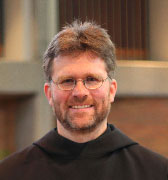 Episode 9- Â The Holy Rule of St. Benedict: A Spiritual Path for Today’s World with Fr. Mauritius Wilde O.S.B., PhD.
Episode 9- Â The Holy Rule of St. Benedict: A Spiritual Path for Today’s World with Fr. Mauritius Wilde O.S.B., PhD.
In place of idleness, work
[powerpress]
From the Holy Rule of St. Benedict:
CHAPTER XLVIII
Of the Daily Work
Idleness is the enemy of the soul; and therefore the brethren ought to be employed in manual labor at certain times, at others, in devout reading. Hence, we believe that the time for each will be properly ordered by the following arrangement; namely, that from Easter till the calends of October, they go out in the morning from the first till about the fourth hour, to do the necessary work, but that from the fourth till about the sixth hour they devote to reading. After the sixth hour, however, when they have risen from table, let them rest in their beds in complete silence; or if, perhaps, anyone desireth to read for himself, let him so read that he doth not disturb others. Let None be said somewhat earlier, about the middle of the eighth hour; and then let them work again at what is necessary until Vespers.
If, however, the needs of the place, or poverty should require that they do the work of gathering the harvest themselves, let them not be downcast, for then are they monks in truth, if they live by the work of their hands, as did also our forefathers and the Apostles. However, on account of the faint-hearted let all things be done with moderation.
From the calends of October till the beginning of Lent, let them apply themselves to reading until the second hour complete. At the second hour let Tierce be said, and then let all be employed in the work which hath been assigned to them till the ninth hour. When, however, the first signal for the hour of None hath been given, let each one leave off from work and be ready when the second signal shall strike. But after their repast let them devote themselves to reading or the psalms.
During the Lenten season let them be employed in reading from morning until the third hour, and till the tenth hour let them do the work which is imposed on them. During these days of Lent let all received books from the library, and let them read them through in order. These books are to be given out at the beginning of the Lenten season.
Above all, let one or two of the seniors be appointed to go about the monastery during the time that the brethren devote to reading and take notice, lest perhaps a slothful brother be found who giveth himself up to idleness or vain talk, and doth not attend to his reading, and is unprofitable, not only to himself, but disturbeth also others. If such a one be found (which God forbid), let him be punished once and again. If he doth not amend, let him come under the correction of the Rule in such a way that others may fear. And let not brother join brother at undue times.
On Sunday also let all devote themselves to reading, except those who are appointed to the various functions. But if anyone should be so careless and slothful that he will not or cannot meditate or read, let some work be given him to do, that he may not be idle.
Let such work or charge be given to the weak and the sickly brethren, that they are neither idle, nor so wearied with the strain of work that they are driven away. Their weakness must be taken into account by the Abbot.
Father Mauritius Wilde, OSB, Ph.D., did his philosophical, theological and doctoral studies in Europe. He is the author of several books and directs retreats regularly. He serves as Prior of our monastery in Schuyler.
 For more information about the ministry of the the Missionary Benedictines of Christ the King Priory in Schuyler, Nebraska visit here:
For more information about the ministry of the the Missionary Benedictines of Christ the King Priory in Schuyler, Nebraska visit here:
Tags: Daily Work, silence, truth, work
This entry was posted on Tuesday, October 29th, 2013 at 10:51 am
You can follow any responses to this entry through the RSS 2.0 feed.
Episode 5 – Regnum Novum: Bringing forth the New Evangelization through Catholic Social Teaching with Omar Guiterrez - Value 4 Truth, Freedom, Justice, and Love part 2 “Justice”
-Â Value 4 Truth, Freedom, Justice, and Love part 2 “Justice”
[powerpress]
From episode 5… Truth, Freedom, Justice, and Love part 2Â “Justice”
These are the four values of the Social Teaching of the Catholic Church as they’re enumerated in the Compendium and as they were laid out by, again, Blessed Pope John XXIII in Mater et magistra and Pacem in terris. Without these values, the work of social justice becomes an albatross around our necks. It pulls us down, threatening to poison all the work we do, no matter how well intentioned.
Justice requires we know what is due to our neighbor. But even when justice is achieved, it can be cold and impersonal, as Pope John Paul II said. This is why the phrase “social justice†appears so rarely in the Church’s Social Teaching. Justice is the bare minimum, and we are not looking for the minimum.
((Truth, Freedom and Love are covered in other episodes)
We live at a very special time. The confluence of many things has brought forth the clear need to be able to articulate the Social Teaching of the Catholic Church in a way that is accessible and applicable. This is not to be an effort where high-minded theories are to be bandied about. Rather, this is a time of opportunity wherein we can apply the Social Doctrine to the concrete so as to bring about a New Kingdom, a Revolution. – Omar G.Â
Discerning Hearts is blessed to present Omar F. A. Guiterrez, M.A. , Special Assistant  to Archbishop George Lucas of the Archdiocese of Omaha, in a groundbreaking series which breaks open the heart of Catholic Social Doctrine.
Tags: freedom, social doctrine, social justice, Social Teaching, truth, work
This entry was posted on Wednesday, October 9th, 2013 at 12:57 am
You can follow any responses to this entry through the RSS 2.0 feed.
Episode 8 -Encountering Truth – Listening For Truth– 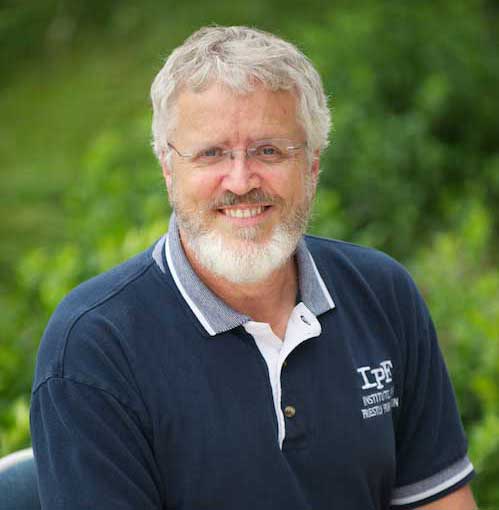   When we come upon the Truth, we rest in it our journey is over.  The Lord wants us to rest in Him.  We rest when we receive the truth about what is good for us and what is ethical.  Within us is the mind that can discern truth and receives it and then have that truth confirmed by the indwelling presence of God.  It’s in the still small voice that will confirm, we have to learn how to go inward to hear it.  To properly form conscience we have to 1. Know who we are, 2. Find where we learn about moral truth,  3.  Discern who we go to with our questions.  The fullness of Truth is taught in the Church.
  When we come upon the Truth, we rest in it our journey is over.  The Lord wants us to rest in Him.  We rest when we receive the truth about what is good for us and what is ethical.  Within us is the mind that can discern truth and receives it and then have that truth confirmed by the indwelling presence of God.  It’s in the still small voice that will confirm, we have to learn how to go inward to hear it.  To properly form conscience we have to 1. Know who we are, 2. Find where we learn about moral truth,  3.  Discern who we go to with our questions.  The fullness of Truth is taught in the Church.
[powerpress]
Deacon James Keating, PhD., the director of Theological Formation for the Institute for Priestly Formation, located at Creighton University, in Omaha, is making available to â€Discerning Hearts†and all who listen, his series of programs entitled “Listening For Truthâ€.
 Listening for Truth leads men and women in a search for a fuller experience of God that begins in prayer, grows in the rediscovery of our spiritual being, and grounds itself in the truth of Jesus Christ. A presentation of the Christian life as an engagement of the whole person — body, mind, and soul — in the challenge of daily living.
Listening for Truth leads men and women in a search for a fuller experience of God that begins in prayer, grows in the rediscovery of our spiritual being, and grounds itself in the truth of Jesus Christ. A presentation of the Christian life as an engagement of the whole person — body, mind, and soul — in the challenge of daily living.
For more information on the “Institute of Priestly Formation†and for other material available by Deacon Keating, just click here
Don’t forget to pickup a copy of “Communion with Christ†, it is one of the best audio sets on prayer…ever!
Check out Deacon Keating’s “Discerning Heart†page
Tags: creighton university, Deacon James Keating, Deacon Keating, truth
This entry was posted on Monday, October 7th, 2013 at 8:14 pm
You can follow any responses to this entry through the RSS 2.0 feed.
CW2 – Praying with the Angels  – The Great Cloud of Witnesses: Guides 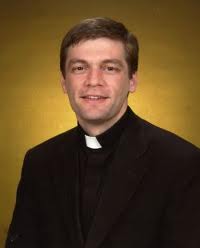 for Prayer with Fr. Mark Cyza
for Prayer with Fr. Mark Cyza
[powerpress]
Fr. Mark Cyza discusses the Angels. Â Guardian Angels and their purpose, as well as, how to pray with our Guardian Angel is part of the teaching he touches upon. Â He also touches upon the difference between the Holy Angels and the Fallen Angels, what is the proper understanding we should have concerning them.
 From the Catechism of the Catholic Church
The existence of angels – a truth of faith
328Â The existence of the spiritual, non-corporeal beings that Sacred Scripture usually calls “angels” is a truth of faith. The witness of Scripture is as clear as the unanimity of Tradition.
329 St. Augustine says: “‘Angel’ is the name of their office, not of their nature. If you seek the name of their nature, it is ‘spirit’; if you seek the name of their office, it is ‘angel’: from what they are, ‘spirit’, from what they do, ‘angel.'”188 With their whole beings the angels are servants and messengers of God. Because they “always behold the face of my Father who is in heaven” they are the “mighty ones who do his word, hearkening to the voice of his word”.189
330 As purely spiritual creatures angels have intelligence and will: they are personal and immortal creatures, surpassing in perfection all visible creatures, as the splendor of their glory bears witness.190
331 Christ is the center of the angelic world. They are his angels: “When the Son of man comes in his glory, and all the angels with him. . “191 They belong to him because they were created through and for him: “for in him all things were created in heaven and on earth, visible and invisible, whether thrones or dominions or principalities or authorities – all things were created through him and for him.”192 They belong to him still more because he has made them messengers of his saving plan: “Are they not all ministering spirits sent forth to serve, for the sake of those who are to obtain salvation?”193
332Â Angels have been present since creation and throughout the history of salvation, announcing this salvation from afar or near and serving the accomplishment of the divine plan: they closed the earthly paradise; protected Lot; saved Hagar and her child; stayed Abraham’s hand; communicated the law by their ministry; led the People of God; announced births and callings; and assisted the prophets, just to cite a few examples.194Â Finally, the angel Gabriel announced the birth of the Precursor and that of Jesus himself.195 (more…)
Tags: Church, faith, Mark Cyza, truth
This entry was posted on Wednesday, October 2nd, 2013 at 1:58 am
You can follow any responses to this entry through the RSS 2.0 feed.
Episode 4 – Regnum Novum: Bringing forth the New Evangelization through Catholic Social Teaching with Omar Guiterrez - Value 4 Truth, Freedom, Justice, and Love part 1 “Truth and Freedom”
-Â Value 4 Truth, Freedom, Justice, and Love part 1 “Truth and Freedom”
[powerpress]
From episode … 4. Truth, Freedom, Justice, and Love part 1Â “Truth and Freedom”
These are the four values of the Social Teaching of the Catholic Church as they’re enumerated in the Compendium and as they were laid out by, again, Blessed Pope John XXIII in Mater et magistra and Pacem in terris. Without these values, the work of social justice becomes an albatross around our necks. It pulls us down, threatening to poison all the work we do, no matter how well intentioned.
When charity lacks truth, as Pope Benedict XVI states, it can be filled with every whim and agenda and becomes the opposite of itself. Truth is the truth of the fundamental dignity of the human person, a dignity we can only fully appreciate in the encounter with Christ.
A freedom that requires self-destruction is no freedom at all. Authentic freedom is the ability to do what is good, but this requires that we know the truth about the good.
(Justice and Love covered in next episode)
We live at a very special time. The confluence of many things has brought forth the clear need to be able to articulate the Social Teaching of the Catholic Church in a way that is accessible and applicable. This is not to be an effort where high-minded theories are to be bandied about. Rather, this is a time of opportunity wherein we can apply the Social Doctrine to the concrete so as to bring about a New Kingdom, a Revolution. – Omar G.Â
Discerning Hearts is blessed to present Omar F. A. Guiterrez, M.A. , Special Assistant  to Archbishop George Lucas of the Archdiocese of Omaha, in a groundbreaking series which breaks open the heart of Catholic Social Doctrine.
Tags: freedom, Social Teaching, truth, work
This entry was posted on Tuesday, October 1st, 2013 at 9:52 am
You can follow any responses to this entry through the RSS 2.0 feed.
Episode 7 -Listening For Truth–   Resurrection people who live out of the power of the Resurrection.  Theological virtues, faith, hope and love, are given to us in the fullest sense through the sacraments and how we receive and open our hearts to that gift.  Moving our affection from sin to truth.  How do we prepare ourselves to receive moral truth?
[powerpress]
Deacon James Keating, PhD., the director of Theological Formation for the Institute for Priestly Formation, located at Creighton University, in Omaha, is making available to â€Discerning Hearts†and all who listen, his series of programs entitled “Listening For Truthâ€.
 Listening for Truth leads men and women in a search for a fuller experience of God that begins in prayer, grows in the rediscovery of our spiritual being, and grounds itself in the truth of Jesus Christ. A presentation of the Christian life as an engagement of the whole person — body, mind, and soul — in the challenge of daily living.
Listening for Truth leads men and women in a search for a fuller experience of God that begins in prayer, grows in the rediscovery of our spiritual being, and grounds itself in the truth of Jesus Christ. A presentation of the Christian life as an engagement of the whole person — body, mind, and soul — in the challenge of daily living.
For more information on the “Institute of Priestly Formation†and for other material available by Deacon Keating, just click here
Don’t forget to pickup a copy of “Communion with Christ†, it is one of the best audio sets on prayer…ever!
Check out Deacon Keating’s “Discerning Heart†page
Tags: creighton university, Deacon James Keating, sin, truth
This entry was posted on Tuesday, October 1st, 2013 at 9:43 am
You can follow any responses to this entry through the RSS 2.0 feed.
Episode 1 – Regnum Novum: Bringing forth the New Evangelization through Catholic Social Teaching with Omar Guiterrez – Introduction and Value # 1 – Jesus Christ
– Introduction and Value # 1 – Jesus Christ
[powerpress]
From episode … 1.     Jesus Christ
You may not believe how many advocates of social justice are only too ready to chuck Jesus out the window in order to get you to buy their plan. One such program of which I’m familiar actually includes materials that deny the divinity of Christ, several times, and deny the salvific work of the cross. As Pope Paul VI and Pope Benedict XVI have said, the Social Doctrine is evangelization. If it is not rooted in the truth, then it can be manipulated to mean whatever one wants it to mean. The truth is quite simply, Jesus Christ who, as Gaudium et spes states, reveals man to himself. The Social Doctrine and the work of charity must stem from an intimate knowledge of Jesus Christ so that they might serve the whole person and point back to Christ.
We live at a very special time. The confluence of many things has brought forth the clear need to be able to articulate the Social Teaching of the Catholic Church in a way that is accessible and applicable. This is not to be an effort where high-minded theories are to be bandied about. Rather, this is a time of opportunity wherein we can apply the Social Doctrine to the concrete so as to bring about a New Kingdom, a Revolution. – Omar G.Â
Discerning Hearts is blessed to present Omar F. A. Guiterrez, M.A. , Special Assistant  to Archbishop George Lucas of the Archdiocese of Omaha, in a groundbreaking series which breaks open the heart of Catholic Social Doctrine.
Tags: jesus christ, social doctrine, truth, work
This entry was posted on Wednesday, September 4th, 2013 at 8:17 am
You can follow any responses to this entry through the RSS 2.0 feed.
Faith and the Reasoning of the Religious Mind : 19th Sunday in Ordinary Time 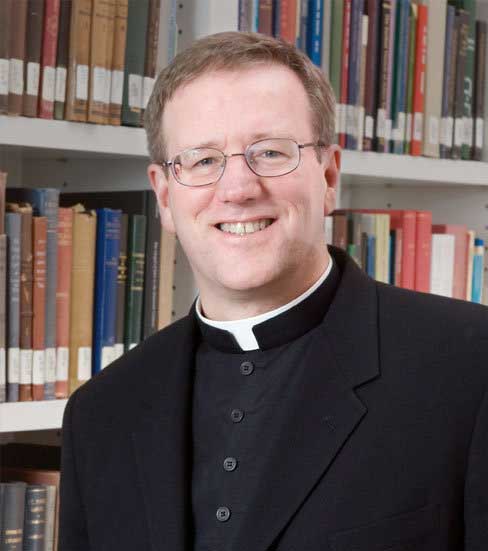
[powerpress]
God cannot be analyzed scientifically the way one would study the things of the world, but God can be approached through religious reasoning, or Faith. Faith is often criticized as unintelligent tomfoolery. Nothing could be farther from the truth. The Catholic tradition reveals that Faith is a rational reaction to God in the religious person. It is the reasoning of the religious mind.
For the readings of the Nineteenth Sunday in Ordinary Time
For more from Fr. Barron go to Word on Fire
Tags: faith, Robert Barron, truth
This entry was posted on Friday, August 9th, 2013 at 12:08 am
You can follow any responses to this entry through the RSS 2.0 feed.
“My Nature is Fire”:
In your nature, eternal Godhead,
I shall come to know my nature.
And what is my nature, boundless love?
It is fire,
because you are nothing but a fire of love.
And you have given humankind
a share in this nature,
for by the fire of love you created us.
And so with all other people
and every created thing;
you made them out of love.
O ungrateful people!
What nature has your God given you?
His very own nature!
Are you not ashamed to cut yourself off from such a noble thing
through the guilt of deadly sin?
O eternal Trinity, my sweet love!
You, light, give us light.
You, wisdom, give us wisdom.
You, supreme strength, strengthen us.
Today, eternal God,
let our cloud be dissipated
so that we may perfectly know and follow your Truth in truth,
with a free and simple heart.
God, come to our assistance!
Lord, make haste to help us!Amen.
Heavenly Father, your glory is in your saints. We praise your glory in the life of the admirable St. Catherine of Siena, virgin and doctor of the Church. Her whole life was a noble sacrifice inspired by an ardent love of Jesus, your unblemished Lamb. In troubled times she strenuously upheld the rights of His beloved spouse, The Church. Father, honor her merits and hear her prayers for each of us. Help us to pass unscathed through the corruption of this world, and to remain unshakably faithful to the church in word, deed, and example. Help us always to see in the Vicar of Christ an anchor in the storms of life, and a beacon of light to the harbor of your Love, in this dark night of your times and men’s souls. Grant also to each of us our special petition . . . (pause to pray for your own intentions). We ask this through Jesus, your Son, in the bond of the Holy Spirit. Amen.
St. Catherine of Siena, Pray for us.
For the complete novena visit the St. Catherine of Siena Novena Page
This entry was posted on Monday, April 29th, 2013 at 5:49 am
You can follow any responses to this entry through the RSS 2.0 feed.
The Eternal Father speaks to Catherine:
My Truth invited you to call out thus when He said: “Call and you will be answered; knock and it shall be opened to you; ask and it shall be given to you.” So I am telling you what I want you to do. Never relax your desire to ask for My help. Never lower you voice in crying out to Me to be merciful to the world. Never stop knocking at the door of my Truth by following in His footsteps. Find your delight with Him on the cross by feeding on souls for the glory and praise of My Name.
Heavenly Father, your glory is in your saints. We praise your glory in the life of the admirable St. Catherine of Siena, virgin and doctor of the Church. Her whole life was a noble sacrifice inspired by an ardent love of Jesus, your unblemished Lamb. In troubled times she strenuously upheld the rights of His beloved spouse, The Church. Father, honor her merits and hear her prayers for each of us. Help us to pass unscathed through the corruption of this world, and to remain unshakably faithful to the church in word, deed, and example. Help us always to see in the Vicar of Christ an anchor in the storms of life, and a beacon of light to the harbor of your Love, in this dark night of your times and men’s souls. Grant also to each of us our special petition . . . (pause to pray for your own intentions). We ask this through Jesus, your Son, in the bond of the Holy Spirit. Amen.
St. Catherine of Siena, Pray for us.
(First paragraph excerpt taken from  Dialogue of St Catherine,(Chapter 107), Translated by Suzanne Noffke, Classics of Western Spirituality Series.)
For the complete novena visit the St. Catherine of Siena Novena Page
Tags: death, heart, Heavenly Father, holy spirit, Jesus, st catherine of siena, the cross, truth
This entry was posted on Monday, April 22nd, 2013 at 12:02 am
You can follow any responses to this entry through the RSS 2.0 feed.
Below a Vatican Radio translation of the Holy Father’s general audience catechesis
Dear Brothers and Sisters,
Last Wednesday we reflected on the desire for God that the human being carries deeply within himself. Today I would like to continue and deepen this aspect meditating briefly on some paths to knowing God, remembering, however, that God’s initiative always precedes any action of man, and even in the journey towards Him, it is He who first enlightens us, guides us and leads us, always respecting our freedom. And it is always He who allows us enter into his intimacy, revealing and gifting Himself us the grace to be able to welcome this revelation in faith. Let us never forget the experience of St. Augustine: it is not we who seek or possess the Truth, but the Truth that seeks us out and posses us.
However, there are paths that can open the human heart to knowledge of God’, there are signs that lead to Him. Of course, often we are in danger of being dazzled by the glitter of worldliness, which make us less able to travel these paths or to read those signs. However, God does not tire to look for us, He is faithful to the humanity He created and redeemed, He remains close to our lives, because He loves us. And ‘this a certainty that must accompany us each and every day, even if certain widespread mentalities make it increasingly difficult for the Church and the Christian to communicate the joy of the Gospel to all creatures and all lead to an encounter with Jesus, the one Saviour of the world. This, however, is our mission, the mission of the Church and every believer must live it joyfully, feeling it to be his or her own, through a life truly animated by faith, marked by charity, service to God and to others, and capable of radiating hope. This mission shines above all in the holiness to which all are called.
Today difficulties and trials are not lacking for the faith, often poorly understood, challenged, rejected. St. Peter said to his Christians: “Always be ready to respond, but with gentleness and respect, to anyone who asks you for the hope that is in your hearts” (1 Pt 3:15). In the past, in the West, in a society that is considered Christian, faith was the environment in which we moved; the reference and adhesion to God were, for most people, part of everyday life. Rather, it was those who do not believe that had to justify their disbelief. In our world, the situation has changed and, increasingly, the believer must be able to account for the reasons of his faith. Blessed John Paul II, in the Encyclical Fides et Ratio, emphasized how faith is put to the test in these times, crossed by subtle and insidious forms of theoretical and practical atheism (cf. nn. 46-47). From the Enlightenment onwards, the criticism of religion has intensified, history has also been marked by the presence of atheistic systems, in which God was considered a mere projection of the human mind, an illusion, and the product of a society already distorted by alienation. The last century has seen a strong and growing secularism, in the name of the absolute autonomy of man, considered as a measure and artifice of reality, but depleted of his being created “in the image and likeness of God.” In our time there is a particularly dangerous phenomenon for the faith: there is in fact a form of atheism that we define, as ‘practical’, which does not deny the truths of faith or religious rituals, but simply considers them irrelevant to everyday existence, detached from life, useless. Often, then, people believe in God in a superficial way, but live “as if God did not exist” (etsi Deus non daretur). In the end, however, this way of life is even more destructive, because it leads to indifference towards faith and the question of God
Tags: beauty, faith, freedom, truth
This entry was posted on Wednesday, November 14th, 2012 at 12:22 pm
You can follow any responses to this entry through the RSS 2.0 feed.
[powerpress]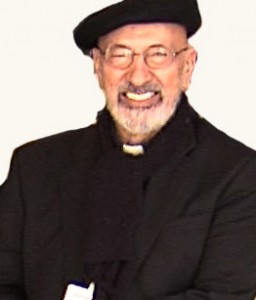
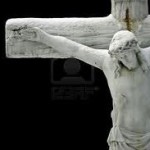 Msgr. Esseff spoke at a recent conference which was held in PA. in November 2011. In the 3rd talk he speaks about sinfulness. Â Â Our mistaken notions and what we should know. What are the traps, what will free us. How confession can bring us into right order.
Msgr. Esseff spoke at a recent conference which was held in PA. in November 2011. In the 3rd talk he speaks about sinfulness. Â Â Our mistaken notions and what we should know. What are the traps, what will free us. How confession can bring us into right order.
Be sure to visit Msgr. Esseff’s website: Â Building A Kingdom of Love
Tags: catholic, catholic podcast, catholic prayer, cathollc spirituality, Esseff, forgiveness, John Esseff, mistaken notions, msgr. john esseff, sin, truth
This entry was posted on Wednesday, December 14th, 2011 at 10:28 am
You can follow any responses to this entry through the RSS 2.0 feed.
 Katie Davis is “just a normal girl who is trying to do what God has asked her to do”.  “Kisses from Katie: A story of relentless love and redemption” is written by 22 year old Katie, who went to mission for a “short” time in Uganda and found God had another plan.  Now she is the adopted mother of 13 girls and founder of  Amazima Ministries, which encourages orphaned and vulnerable children and the poor in the country of Uganda. In the Lugandan language, Amazima (uh-mahz-i-muh) means “truth.” Amazima desires to reveal the truth of God’s unconditional love through Jesus Christ to the Ugandan people.  Katie is remarkable and inspiring and a joy to read and talk with.  Please, say a prayer for her and her “kids” today.
Katie Davis is “just a normal girl who is trying to do what God has asked her to do”.  “Kisses from Katie: A story of relentless love and redemption” is written by 22 year old Katie, who went to mission for a “short” time in Uganda and found God had another plan.  Now she is the adopted mother of 13 girls and founder of  Amazima Ministries, which encourages orphaned and vulnerable children and the poor in the country of Uganda. In the Lugandan language, Amazima (uh-mahz-i-muh) means “truth.” Amazima desires to reveal the truth of God’s unconditional love through Jesus Christ to the Ugandan people.  Katie is remarkable and inspiring and a joy to read and talk with.  Please, say a prayer for her and her “kids” today.
[powerpress]
You can find the book here
Katie’s blog is here
Tags: catholic, catholic podcast, catholic prayer, cathollc spirituality, Katie Davis, love, truth, Uganda
This entry was posted on Friday, December 9th, 2011 at 8:57 am
You can follow any responses to this entry through the RSS 2.0 feed.








